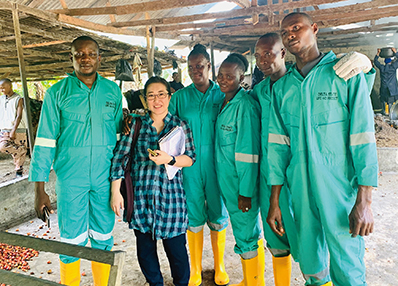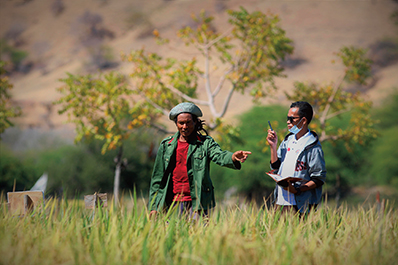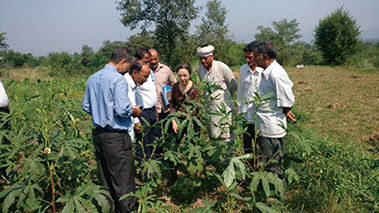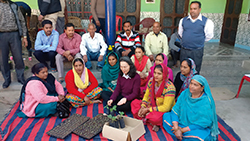(8) Food Security and Nutrition
According to the report of “The State of Food Security and Nutrition in the World 2021,” Note 70 in 2020, due to the impact of COVID-19 and other factors, the number of chronically undernourished people increased by more than 100 million compared to 2019, and between 720 million and 811 million people worldwide were chronically undernourished. This means that approximately one in ten people were chronically undernourished around the world. The report noted that exceptional efforts are required to achieve the SDGs by 2030. It also indicated that transforming food systems is essential to ensure food security. Note 71
● Japan’s Efforts

A Japanese staff member of the International Fund for Agricultural Development (IFAD) (dispatched under the JPO Programme) observing agricultural employment training for young people implemented in Nigeria (Photo: IFAD)
Japan proactively addresses food-related problems as a global issue, giving priority to cooperation for the promotion of agriculture, forestry, and fisheries, including the development of food value chains.* In the short term, Japan provides food assistance to developing countries to avert food shortages, and in the medium to long-term, it aims to help increase and improve agricultural production and productivity in developing countries in order to prevent and eliminate the causes of food-related problems including hunger (see also “Project Introduction Columns” on Albania, and on Ethiopia, Mali, Nigeria, and Uganda regarding efforts to assist smallholder farmers).
■ UN Food Systems Summit
In September 2021, the UN Food Systems Summit was held for the first time with the purpose of realizing a recovery from the effects of the COVID-19 pandemic, through the transformation of “food systems” which consist of food production, distribution and consumption, as well as of achieving the SDGs by 2030. Japan announced that it would work towards establishing better global “food systems,” focusing on the following three points: (i) to achieve both productivity improvement and sustainability by driving innovation, digitalization, and the utilization of science and technology; (ii) to maintain and strengthen free and fair trade, including the restraint of import and export restrictions based on arbitrary measures without scientific evidence; and (iii) to take an approach considering each country and region’s climate and nature, as well as their food culture.
■ Efforts to Provide Food Assistance and Improve Nutrition
Japan has provided the Food Aid Programme based on requests from developing countries confronting food shortages. In 2021, Japan contributed a total of ¥7.4 billion in 25 countries and regions by mainly providing the Japanese government’s stockpile rice.
In addition to bilateral support, Japan is also engaged in efforts to provide food assistance in cooperation with international organizations. For example, through WFP, Japan implements measures such as school meals programmes to improve access to education, as well as initiatives of food-for-work programmes to encourage people to participate in the development of agricultural land and social infrastructure through the distribution of food. In 2021, Japan also supported the flood-damaged south-central region of Laos by providing supplies and equipment for agricultural infrastructure development and by conducting training to improve disaster risk reduction capabilities. In 2020, WFP conducted activities including the distribution of approximately 4.2 million tons of food to approximately 111.5 million people in 84 countries around the world. In 2020, Japan contributed a total of approximately $196.13 million to the WFP projects.
Furthermore, Japan supports the improvement of nutrition in developing countries through contributions to the multilateral development banks (MDBs). Japan announced additional contributions totaling $70 million to the World Bank’s Global Financing Facility (GFF)* and the Japan Trust Fund for Scaling Up Nutrition in 2021.* In addition, from the perspective of mainstreaming nutrition in development policy, Japan hosted the 20th replenishment meeting of the International Development Association (IDA) of the World Bank Group in December 2021 where an agenda of strengthening human capital, including improving nutrition status, is included as a priority area (see “ODA Topics 1” for the IDA20 Replenishment).
■ Tokyo Nutrition for Growth Summit 2021
The Government of Japan hosted the “Tokyo Nutrition for Growth Summit 2021” on December 7 and 8, 2021. The Summit addressed the global challenge of the “double burden of malnutrition,” where one in ten people in the world suffers from hunger and undernutrition, while one in three people is overweight or obese. It also discussed five thematic areas to address the worsening global nutrition situation due to COVID-19: (i) health, (ii) food, (iii) resilience, (iv) accountability, and (v) financing (see “ODA Topics 3” on the Tokyo Nutrition for Growth Summit 2021).
The outcome document of the Summit, “the Tokyo Compact on Global Nutrition for Growth,” was endorsed by 215 stakeholders including 65 governments and 60 private companies, and the direction for future efforts by the international community to improve nutrition was set. Furthermore, 181 stakeholders, including 66 governments, 26 private companies, and 51 civil societies, submitted 396 commitments (statements of their policy and financial intentions). More than $27 billion in nutrition-related financial contributions was announced by governments and other stakeholders, including Japan’s contribution of more than ¥300 billion in nutrition-related assistance announced by Prime Minister Kishida. By promoting concrete actions by a wide range of stakeholders in this way, Japan led efforts to improve nutrition around the world.
In addition, on the occasion of the Summit, Science and Technology Advisor to the Minister for Foreign Affairs MATSUMOTO Yoichiro and Science and Technology Co-Advisor to the Minister for Foreign Affairs KANO Mitsunobu, together with like-minded international science and technology advisors, Note 72 issued a joint statement titled “Promoting Global Utilization of Science, Technology and Innovation for Food Systems Transformation to Ensure the Health of People and the Planet (STEPP).”
■ Establishment of Food Value Chains and Promotion of Agriculture, Forestry, and Fisheries

A JICA Timor-Leste office staff and an official from the country’s Ministry of Agriculture and Fisheries conducting a survey to improve rice farming techniques (Photo: JICA)
In developing countries, low purchase prices for agricultural products are one of the factors that prevent many farmers from escaping poverty. Japan is promoting the establishment of food value chains for developing countries in cooperation with private companies. In FY2021, based on the “Plan to Promote the Establishment of Global Food Value Chain,” Japan organized bilateral policy dialogues with Palau and workshops with Thailand and Viet Nam.
Moreover, Japan places emphasis on agriculture as an essential industry that plays an important role in Africa’s economic growth, and actively contributes to its development (see “Project Introduction Column” on Ghana for efforts on agriculture that take into account children’s rights in Ghana, and “Project Introduction Column” on Ethiopia, Mali, Nigeria, and Uganda for the digital transformation (DX) of agriculture in Africa). Specifically, under the Coalition for African Rice Development (CARD)* 2nd phase, efforts are underway to improve the quantity and quality of rice production applying the RICE approach.* The approach includes support for the development of irrigation facilities, research on superior rice varieties including New Rice for Africa (NERICA),* a hybrid of Asian and African rice varieties, and dissemination of production technology.
Moreover, in order to transform agriculture from self-sufficient to income generating activities, Japan has trained 18,013 technical instructors and 183,042 smallholders from 29 countries, including non-African countries, to promote market-oriented agriculture through the Smallholder Horticulture Empowerment & Promotion (SHEP) approach* by the end of 2021.
■ Food Security through a Multilateral Cooperation Approach
Furthermore, Japan has been involved in the development of the Agricultural Market Information System (AMIS) Note 73 in order to contribute to the improvement of food security through enhancement of transparency in international agricultural markets. Japan has provided project costs to AMIS, while sharing information on Japan’s experiences.
Japan also provides assistance in the agricultural sector through international organizations such as FAO, IFAD, the Consultative Group on International Agricultural Research (CGIAR), and WFP in order to strengthen developing countries’ own foundations for food production. For example, Japan, in partnership with FAO, has provided assistance in technical cooperation for the agricultural and rural development of developing countries, the establishment of international standards and norms in the food and agriculture fields, and the development of statistics, etc. In addition, Japan has provided support for research on the variety development conducted by CGIAR, which is comprised of 15 international agricultural research institutions.
Furthermore, in addition to these assistance in the agricultural sector, Japan makes contributions to the enhancement of animal hygiene through the World Organisation for Animal Health (OIE) and FAO. For example, Japan participates in the Global Framework for Progressive Control of Transboundary Animal Diseases (GF-TADs), which was established by OIE and FAO in response to transboundary zoonotic diseases such as foot-and-mouth disease and African Swine Fever (ASF), and supports the initiatives of international organizations in the field of animal hygiene mainly for the Asia-Pacific region.
Glossary
- Global Financing Facility (GFF)
- This initiative was launched in 2015 by the World Bank, the United Nations, and others to expand financial resources for the maternal and child health field. The GFF provides technical assistance for the formulation of maternal and child health policies, including those to improve the nutritional status of women and children, and for the enhancement of implementation capacity. The GFF aims to effectively mobilize funds by providing support to formulate plans with the pre-condition that low-interest loans from the World Bank and other sources are used to implement said plans.
- Japan Trust Fund for Scaling Up Nutrition
- The Trust Fund was established in 2009 to scale up nutrition investments in high undernutrition-burden countries and to strengthen in-country capacity to implement nutrition programs. It provides technical assistance to high undernutrition-burden countries to formulate policies for improving nutrition and to improve their implementation capabilities, thereby boosting nutrition investments by the countries concerned and the World Bank.
- Food Value Chain
- This is an activity in which many stakeholders, including the farmers, suppliers of farming implements such as seeds, fertilizers, and farming machinery, processing companies of agricultural produce, transportation and distribution companies, and retailers, cooperate to create a chain that can enhance the added value of agricultural produce from the stages of production, to manufacturing and processing, distribution, and consumption. For example, it includes improving the quality of products, developing attractive new products, reducing transportation costs, increasing sales opportunities by expanding the sales network, and other activities.
- Coalition for African Rice Development (CARD)
- CARD is a consultative group composed of donor countries, African regional organizations, and international organizations, partnered with rice-producing countries in Africa that are interested in rice production and development. It was proposed and launched by Japan at the TICAD IV in 2008 to support self-help efforts toward the expansion of rice production in Africa. Japan also launched the CARD Phase 2 at TICAD7 in 2019.
- Resilience, Industrialization, Competitiveness, Empowerment (RICE) approach
- An initiative adopted under CARD Phase 2 to realize the goal of doubling rice production in Sub-Saharan Africa. Specific efforts include stabilizing production through adaption to climate change and population growth, industrial formation in local areas in cooperation with the private sector, enhancing the quality of home-grown rice so that it can compete with imported rice, and the establishment of agricultural management systems for improving the household incomes and livelihoods of farmers.
- New Rice for Africa (NERICA)
- NERICA is a general term for rice developed in 1994 by the CGIAR Africa Rice Center through the hybridization of high-yield Asian rice with African rice, which is resistant to weeds, diseases, and insect pests. In order for NERICA to suit the natural conditions of each region in Africa, they are characterized by (i) a higher yield, (ii) a shorter growth period, (iii) higher resistance to dryness (drought), and (iv) higher resistance to diseases and insect pests than conventional rice. Since 1997, Japan has partnered with international organizations and NGOs and provides support for research and development related to new types of NERICA, test cultivation, and increased production and popularization of seeds. In addition, Japan has dispatched agricultural experts and JOCVs to offer cultivation training and has also accepted trainees from Africa for training in Japan.
- Smallholder Horticulture Empowerment & Promotion (SHEP) approach
- The SHEP approach refers to an effort to assist smallholder farmers producing fruits, vegetables, and other produce and was started by Japan in Kenya in 2006, aimed at increasing their income by causing a mindset shift from “selling after growing” to “growing to sell” and through improvements to farm management and cultivation skills. Japan is promoting the activities integrating the SHEP approach around the world with a focus on Africa.
- Responsible Agricultural Investment (RAI)
- RAI is an initiative that aims to reduce the poverty of local residents including farmers and to maximize the interest of investors, as well as to minimize the risks to both local residents and investors, by balancing between the responses to the agricultural investment by domestic and foreign inventors and the responses to the unintentional negative impact of agricultural investment, such as a threat to food security and rights of the local people including land ownership in rural areas of developing countries. The initiative was proposed by Japan at the G8 L’Aquila Summit (2009), and Principles for Responsible Agriculture Investment (PRAI) were formulated by four international organizations: FAO, IFAD, the United Nations Conference on Trade and Development (UNCTAD), and the World Bank. In 2014, the Committee on World Food Security (CFS) adopted the CFS Principles for Responsible Investment in Agriculture and Food Systems (CFS-RAI).
India
Himachal Pradesh Crop Diversification Promotion Project (Phase 2)
Technical Cooperation Project (March 2017 – February 2022)
Himachal Pradesh State in India, located in the foothills of the Himalayas, had not sufficiently developed irrigation facilities, therefore agriculture was centered on cereal crop cultivation dependent on rainwater, which limited production to only self-sufficient volumes. Furthermore, increasing farmers’ income has been a challenge since 80% of them are smallholders.
As the state has large elevation differences, from 300 meters to 7,000 meters above sea level, and the climate is cool, the harvesting seasons for vegetables, fruit, etc., differ from neighboring major cities, such as Delhi. This means the state can make shipment of its produce in the off-season. Beginning with the development survey started in 2007, Japan has been providing continuous support so that those farmers can cultivate not only the conventional cereal crops but also crops with a high commodity value including vegetables and other produce. Japan has combined a variety of its schemes to support them, such as loan aid to develop irrigation facilities and farm roads, and technical cooperation, dispatching Japanese experts for human resources development. Phase 2 of the technical cooperation project began in 2017, which aims at strengthening post-harvest activities such as treatment, processing, and marketing, which contribute to selling agricultural products at higher prices.
Japanese expert Ms. NAGATA Yoko has been supporting the activities of the state’s Department of Agriculture through technical guidance under this project on vegetable cultivation and post-harvest processing. She utilizes Japan’s agricultural techniques, in particular the Nagata Farming Method*1 devised by Mr. NAGATA Terukichi, her father, and provides support for the selection, introduction, and application of appropriate techniques suited to local conditions, while earning the support of the agricultural extension workers and farmers.
A variety of changes have been brought by Japan’s support to date, such as the increase of income of approximately 14,000 smallholders and the introduction of a nutrition improvement project using the harvested vegetables. Through phase 2 of this project, Japan will continue to encourage the diversification of crops and growing of crops with higher added value, which is expected to further improve the income of these farmers.

Ms. Nagata and the Indian agricultural extension workers giving guidance to farmers on okra cultivation techniques (Photo: JICA)

Ms. Nagata and the Indian agricultural extension workers giving guidance to a group of women on how to make the grafted vegetable seedlings (Photo: JICA)
*1 An agricultural method of growing produce with a minimum amount of water and fertilizer.
- Note 70: A report jointly prepared and published by the Food and Agriculture Organization of the United Nations (FAO), the International Fund for Agricultural Development (IFAD), WFP, UNICEF, and WHO.
- Note 71: A state where all people, at all times, can access sufficient, safe, and nutritious food.
- Note 72: Science and technology advisors to foreign ministries, diplomatic missions, and government agencies in the United States, the United Kingdom, Italy, India, the European External Action Service, the Netherlands, and Canada (Government of Quebec).
- Note 73: A system launched in 2011 by the G20 as a measure to counter the wild fluctuations of food prices. Various countries, corporations, and international organizations utilize the system to share information on the agricultural and food market (such as production volumes and prices) in a timely, accurate, and transparent manner.
